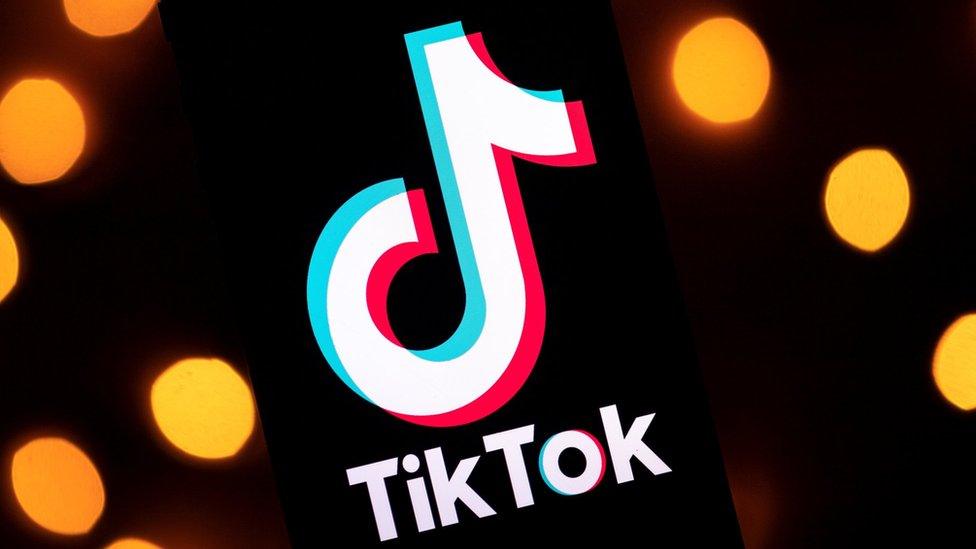Kuaishou share price nearly triples on market launch
- Published

Shares of the Chinese short-form video app Kuaishou surged more than 190% on the company's launch on Hong Kong's stock exchange on Friday.
Shortly after the company listed, shares were selling at more than HK$300 ($38.07; £28.31), nearly triple the list price of HK$115.
Kuaishou is one of the most hotly-anticipated initial public offerings this year and has raised $5.4bn (£4bn).
The app has a massive user base in China and competes with TikTok.
The company's listing is a key test of investors' appetite for Chinese tech companies as Beijing steps up scrutiny of the sector.
What is Kuaishou?
When it was created in 2012, Kuaishou was originally a mobile app for making GIF animations.
Now, it is a short-form video platform that competes with ByteDance's TikTok app, but is also popular for livestreaming.
In documents tendered with the Hong Kong stock exchange, Kuaishou said it aimed to be "the most customer-obsessed company in the world".
Kuaishou claims 305 million daily active users, who spent an average of 86 minutes or more on the app.
Kuaishou shares almost tripled when they launched on Hong Kong’s stock exchange
Content creators made up about 26% of the app's 769 million monthly active users.
The app is particularly popular in China's second and third tier cities, and in rural areas too, where it is often used for group chats and messaging, as well as for videos.
"Some people use Kuaishou more like they use WeChat. Kuaishou has a lot more functionality than TikTok," said Rui Ma, a Chinese tech analyst with Techbuzz China.
In addition to its popularity, the company's revenues grew from $1.3bn in 2017 to $6.2bn in the nine months ended September 30, 2020.
However, it's still not turning a profit. The company reported a loss of $1.1bn over that period.

Many businesses sell their goods via livestreaming over Kuaishou.
How does it make money?
Currently, Kuaishou makes most of its money from livestreaming e-commerce, often featuring celebrities showcasing products to bring in buyers.
It also makes money from virtual gifts, and has increasingly turned to online marketing services, which accounted for 33% of its business in the first three quarters of 2020.


If TikTok epitomises the eccentricities of urban millennials - Kuaishou is the short video app for everyone, no matter where you're from.
Scroll through and you'll find farmers and merchants from villages and lower-tier cities, livestreaming a glimpse of their daily lives.
This is the key difference, the app's young founders say, between it and other social media platforms.
They claim Kuaishou is a more accurate reflection of modern China - where there's a growing sense of inequality between rich and poor, city-livers and rural dwellers, the haves and the have-nots.
The big draw for investors has been the app's ability to tap into these rural markets.
Kuaishou makes money is by allowing livestreamers to sell their products online, and for users to purchase virtual gifts for other users.
But turning these users into real profit will be a challenge.
Despite soaring revenues, Kuaishou is struggling to make a profit.
In its filing to the Hong Kong Stock Exchange, the company says this is a key risk: "the fact that we incurred net losses during the track record period and may not be able to achieve or maintain profitability in the future."
Investors should also pay attention to the changing regulatory environment in China.
Big tech firms like Ant Group are under the spotlight for monopolising the wallets of Chinese internet users.
Livestreaming services and virtual gifting have already caught the attention of Chinese regulators. Kuaishou may not be far behind.

Loyal fans
Although the company isn't yet profitable, Rui Ma said Kuaishou's main strength has been its ability to monetise video content.
Many video apps have a big user base, but only a few have figured out how to make money from them.
"Kuaishou is one of the best companies in capturing those monetisation opportunities. They've been very good at executing, despite all the competition. I think I'm cautiously optimistic," said Rui Ma.
It's customer base outside the major cities is also likely to be an advantage, she said, because they have used the app for many years and are likely to remain loyal.
- Published27 January 2021

- Published4 December 2020

- Published24 October 2019
